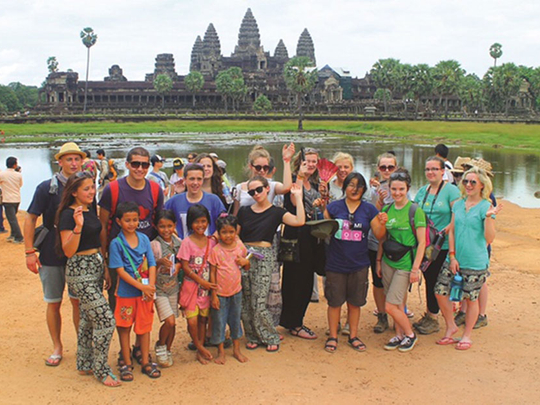
Abu Dhabi: The gap year is ideal for students who feel they need to devote time to something other than academics after graduation. This concept that has helped many students take time off and find their true calling is becoming popular in the UAE.
According to Camps International, a prominent gap year programme provider, believed to be the only organisation of its kind in the UAE, there has been an increase in students taking this route after high school.
Lindsay Spink, marketing manager of Camps International that began its operations in the UAE three years ago, said the concept has only become popular in the UAE in recent years.
“We’ve definitely seen an increase of enquiries from young people from the UAE [about the programmes offered],” Spink revealed. A possible reason could be because of foreigners kick starting the idea. “International students from the West who move to the UAE with their parents bring the gap year culture with them,” Lindsay told Gulf News.
In comparison, taking a gap year has been an established practice in countries like the UK and is on the increase in the US, with institutions like Harvard promoting the idea to incoming students, she said.
Taking time off allows youth to mature and grow as a person, said Lindsay, as it helps them gain independence and find new motivation to commence the next part of their lives.
Hadeel Othman, 24, now a social media coordinator, spent some time taking different courses before starting her university career when it was not heard of to do so in Abu Dhabi.
Initially, it was hard for her to get her parents to accept the concept. “Parents usually associate a gap year with laziness [believing] that all you want to do is sleep and do nothing,” Hadeel said. “[But] I was mentally ready to do something very different after high school.”
According to Hadeel, the year off allowed for a broadening of vision. “I did not want to be boxed in and now [after the gap year], I can be many things - such as a graphic designer, writer or even a social media expert because of the courses I took,” she explained.
Although there are travel and volunteering programmes students can apply for, some graduates find it enriching to go on the journey independently.
Hadeel did not want anything structured, but rather opted to go her own way. She enrolled in an online photography course, painting lessons and travelled. With a trip to Sudan, her interest in cameras ignited. These varying activities stoked in her a passion for communication, she said.
Either way, whether you go in a group or seek an unstructured route, a gap year is useful both ways, as obtaining a global perspective is a key skill in today’s world, said Stuart Rees Jones, founder and CEO of Camps International.
“Volunteer travel creates confident, mature and well-rounded young people, ready to realise their full potential in life,” said Jones.
Nonetheless, taking time off is not for everybody.
You need to know yourself and trust yourself completely, according to Hadeel.
“It depends on trusting yourself … and how well you know yourself and what exactly you want to achieve in your gap year as a whole,” she said.
The ability to be a self-starter is crucial to successfully peeling away for a wile from the beaten path, because, if this discipline is missing, there is the danger of lapsing into laziness and unproductivity, said Hadeel.
“Some people I knew had so many awesome things planned, but slept through them,” she said.
Taking time off can also lead to difficulties when getting back into academics. “I knew people that went back to start university and weren’t motivated, it hindered their progress,” she said.
Today, Hadeel has a diploma in chemical engineering and is also a graduate of communications and marketing.
Heidi Pullyard is a trainee at Gulf News.












